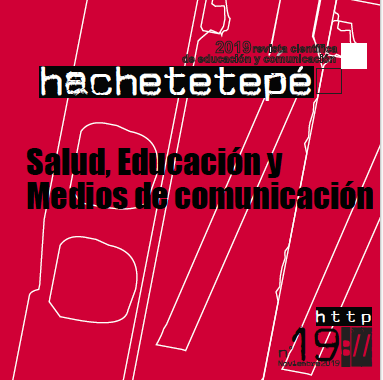¿Cómo generar concienciación en la sociedad y el sistema educativo costarricense a partir de las conclusiones del documental: “Super Size Me” (súper engórdame)?

DOI
https://doi.org/10.25267/Hachetetepe.2019.v2.i19.5Informação
Resumo
Actualmente el ser humano se encuentra inmerso en una serie de actividades académicas, sociales y de esparcimiento pasivo que le dejan poco tiempo para la actividad física y la recreación física. Desafortunadamente, a nivel mundial se ha pasado de un modelo de alimentación casera a alimentos precocinados o comida rápida. Enmarcando en este panorama se encuentra la película-documental “Super Size Me” (Súper Engórdame) la cual argumenta cómo el protagonista decide someterse a un experimento socio-alimenticio de la cultura nutritiva americana basada en comida rápida y pone sobre la mesa uno de los problemas más serios de salud en Estados Unidos: la obesidad. En contraste, Costa Rica se reconoce a nivel internacional por un clima de paz, país sin ejército y su exuberante naturaleza con sus cientos de hectáreas protegidas. Sin embargo, los índices de obesidad van en aumento lo que ha llevado a que surjan esfuerzos de parte del gobierno costarricense por enfrentar dicha epidemia desde las aulas y los comedores escolares.
Palavras-chave
Downloads
Como Citar
Licença

Este trabalho está licenciado sob uma licença Creative Commons Attribution-NonCommercial-NoDerivatives 4.0 International License.
Os autores que publicaram com esta revista, aceitam os seguintes termos:
1. Manterão seus direitos autorais e garantirão à revista o direito à primeira publicação de seu trabalho, que estará simultaneamente sujeita à Licença de Atribuição Creative Commons. Podem ser copiados, utilizados, divulgados, transmitidos e exibidos publicamente, desde que a autoria, url e revista sejam citados, e não sejam utilizados para fins comerciais. Nenhuma obra derivada é permitida.
2. Podem adotar outros contratos de licença não exclusiva para a distribuição da versão publicada da obra (por exemplo, depositá-la em arquivo telemático institucional ou publicá-la em volume monográfico), desde que seja indicada a publicação inicial nesta revista.
3. Divulgue seu trabalho pela Internet (por exemplo, em arquivos telemáticos institucionais ou em seu site) uma vez que o manuscrito seja aceito, o que pode levar a trocas interessantes e ao aumento das citações do trabalho publicado. (Veja O efeito do acesso aberto).
Hachetetepé. A revista científica de educação e comunicação não cobra taxa pela submissão de manuscritos ou pela publicação de seus artigos.
Referências
Austin, R. (2007) Super-Size Me and the Conundrum of Race/Ethnicity, Gender, and Class for
the Contemporary Law-Genre Documentary Filmmaker. Scholarship at Penn Law.
Blázquez, C. (2016) Revolución Industrial 4.0 cambiará no solo lo que hacemos, sino también lo que somos. CYC Prisma, 21; 10-25
Brody, J. (2017). El ´combustible´ del aprendizaje: almuerzos nutritivos en las
escuelas. The New York Times. (8 de junio de 2017). Recuperado de https://www.nytimes.com
Cascales, M. (2008) Obesidad: pandemia del Siglo XXI. Farmacia 11. Madrid 1-33. Recuperado
Costa-Font y Mas N (2014) ¿Globesity? The Effects of Globalization and Caloric IntakeCEsifo.
Working Paper Series, 4982.
Feuerbach, Ludwig (1850). Ensayo: "Enseñanza de la alimentación" (Lehre der Nahrungsmittel:
Für das Volk). Alemania
Hernández, D. y López, P. (2015) Hábitos de una alimentación adecuada en el proceso de
aprendizaje en el niño Kenneth de I nivel del Segundo Ciclo de Preescolar del Centro Educativo Alfonso Cortés del
Distrito VI de Managua durante el II semestre del año 2015. Universidad Nacional Autónoma de Nicaragua; 1-71.
Jiménez C, Jennifer. (2019) “Costa Rica Vive la Peor Epidemia de Obesidad Registrada en toda
su Historia”. Semanario Universidad, Universidad de Costa Rica (UCR) /San Pedro, Costa Rica/ 26 abr. Recuperado de https://www.ucr.ac.cr/noticias/2019
Ministerio de Educación y Equipo Técnico Nacional del Censo. (2017) Informe Ejecutivo. Censo
Escolar Peso/Talla Costa Rica. Ministerio de Educación Pública/Ministerio de Salud de Costa Rica,1; 1-12.
Organización Mundial de la Salud (2004). Organización Mundial de la Salud. Estrategia mundial
sobre régimen alimentario, actividad física y salud de la 57ª Asamblea Mundial de la Salud. Resolución WHO_57.17. Aprobación por los estados miembros de la Resolución WHO_55.23. Recuperado en 2010, de http://apps.who.int/gb/
Organización Mundial de la Salud. (2012). Estadísticas Sanitarias Mundiales una Instantánea de la Salud Mundial. Ginebra. Recuperado de www.who.int.
Organización Mundial de la Salud. (2016). Informe de la Comisión para Acabar con la Obesidad
Infantil. Ginebra. Recuperado de www.who.int.
Organización Mundial de la Salud. Obesidad y sobrepeso (2017). Recuperado de
http://www.who.int/media centre/factsheets/fs311/es/
Pintor, E., Herreros, B., Gargantilla, P. y Vivas E., (2017) Super size me (2004): ¿La película que cambió McDonald’s? Rev Med Cine [Internet], 13 (1); 3-8.
Revista CyC Prisma. (2016) Revolución Industrial 4.0. Entrevista con Robert Shiller volumen 21 ; 6-15. Recuperado de: http://revistaprismacyc.com/prismacyc21/index.html
Spurlock, M. (2004). Film: Super Size Me. (2004) Dir. Morgan. Samuel Goldwyn Films / Roadside Attractions /
Showtime. Género: Documental Sátira/Cocina. DVD/VoD
Universidad de Stanford. “Nutrición: Edad Escolar”. Sandford Children’s Health. Publicación
Web. Recuperado de: https://www.stanfordchildrens.org/es/topic/default?id=school-agedchildnutrition-90-P05389. 1 de setiembre del 2019
UNESCO Education. (2007) Una nutrición adecuada propicia el aprendizaje: la hora de la comida en un centro preescolar de Johannesburgo (Sudáfrica). Informe de Seguimiento de la Educación para todos en el Mundo; 114-125. Recuperado de: http://www.unesco.org/education/GMR/2007/es/capitulo5.pdf





